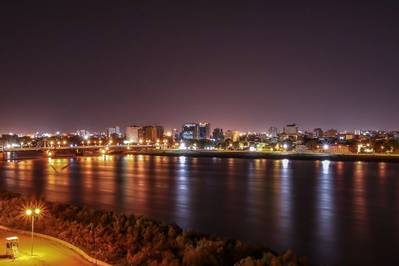Fuel Shortage Hits Sudan as Dollar Crisis Hampers Imports
Vehicles queued for hours at gas stations in Sudan's capital on Tuesday as a fuel shortage caused by the government's difficulty in importing it due to a foreign currency crisis hit home.
Once an exporter of oil, Sudan was forced to begin importing it after the south seceded in 2011, taking with it three-quarters of what had been the country's oil output and its main source of foreign currency.
"I have been waiting at the gas station from last night until midday today. This bus is my only source of income," said Adam Abdullah.
The 45-year-old bus driver is one of many workers who spent the night at a gas station to refuel their vehicles.
"I have been waiting for hours to find transportation to return home. This is something we cannot stand. Where is the government?" asked Intesar Awad from a bus station in the heart of Khartoum.
Hundreds of others queued for rides home around her - joining lines that have built up since the end of last week as the currency crunch has bitten deeper.
The Sudanese pound has dropped to 35 to the dollar from 33 pounds earlier this week, a black market trader told Reuters. He expected the Sudanese pound to weaken further in coming days.
Inflation quickened to 55.6 percent in March year-on-year from 54.34 percent in February.
Prices have risen since the pound plummeted to record lows on the black market in recent months, prompting the central bank to make two steep devaluations since the start of the year.
It now officially trades at about 28 pounds to the dollar from 6.7 pounds in late December.
The Sudanese pound hit a record low of about 40 pounds to the dollar earlier this year on the black market, but the devaluations and a ban on deposits of dollars obtained from the black market have reversed this trend.
The central bank has also introduced restrictions on withdrawals, leaving many unable to take out cash from banks.
Minister of State for Finance Abdelrahman Drar said in a statement on Tuesday that five tankers carrying petroleum products had arrived at Sudan's main port to alleviate the shortages.
Potentially increasing the short-term uncertainty, two Nigerian oil companies, Express and Misana, on Monday sold their 30 percent joint stake in Sudan's al-Rawat oil field to Sudan National Petroleum Corporation or Sudapet, Khartoum's state news agency SUNA reported.
Sudapet now owns all the shares in al-Rawat, which falls along the While Nile, 420 km south of Khartoum. It hopes to increase output in the long-term, reducing the dependence on imports, through increased exploration.
(Reporting by Khalid Abdelaziz Writing by Arwa Gaballa Editing by Alison Williams)







